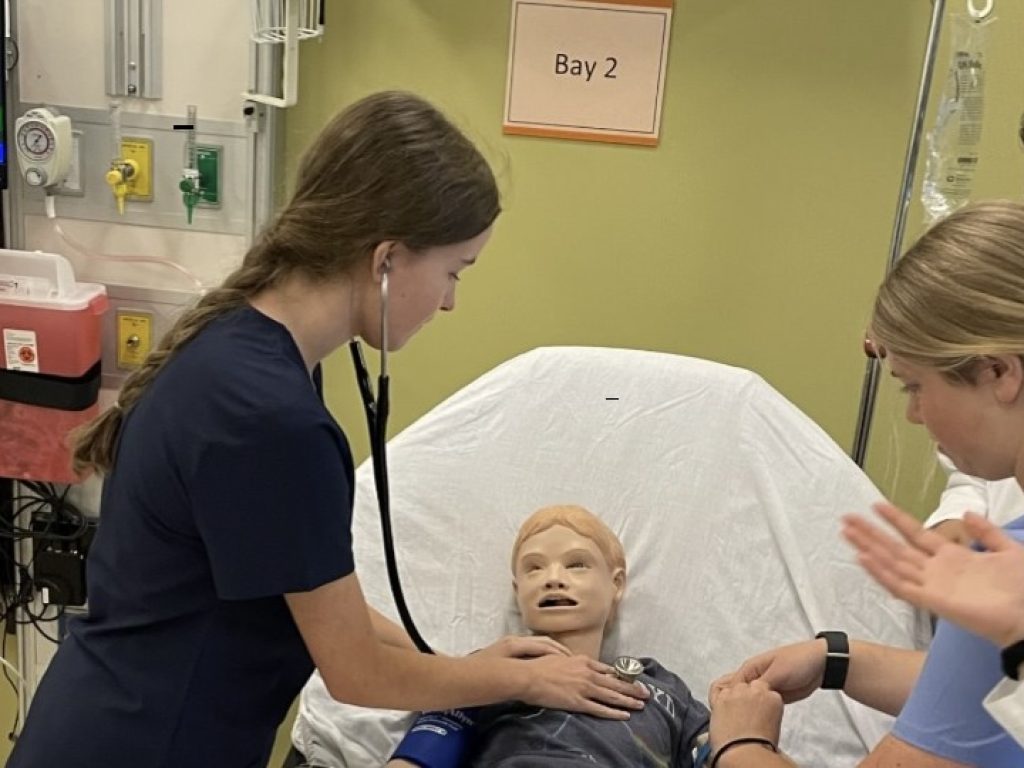
Students of the Campbell University medical school are used to learning as they study to become doctors of osteopathic medicine.
But as part of the recent Mini Medical School, those students got the chance to teach. High school students from throughout eastern North Carolina this summer took part in the inaugural, one-day event for ninth- to 12th-graders.
It was a day, said Dr. Elizabeth Gignac, that allowed the students to explore medical school with medical students as mentors and teachers. The medical students either guided students through some of the eight learning stations or led group tours around the Jerry M. Wallace School of Osteopathic Medicine.
“They had eight different activities,” said Gignac, chair of Simulation & Clinical Education and chair of Emergency Medicine at the med school in a press release. Gignac helped to oversee the program.
“They learned CPR. They learned to use medical instruments like otoscopes and ophthalmoscopes. They got to do simulation cases with a pediatric manikin and an adult manikin. We had an osteopathic manipulative medicine (station) and an ultrasound station. They were pretty busy.”
The high school students also got an idea of what happens in an operating room. They learned how doctors manage a patient’s breathing and airways and about an automated external defibrillator, used to treat people suffering cardiac arrest.
“I absolutely loved my experience working with the students at Mini Med School,” said Lauren Merchant, who is entering her third year at the med school.
“I think Mini Med School is a wonderful opportunity for young aspiring doctors or health care workers to receive a better understanding of what medicine entails. They truly get a behind-the-scenes view of our life as medical students.”
In the 9,000 square-foot simulation center, students got hands-on experience, using the high-tech manikins in a hospital environment, including operating and emergency rooms, an intensive care unit and a birthing suite, as well as virtual ultrasound and multipurpose simulation rooms.
“While they were here, we also gave them a little bit of an introduction to the College of Pharmacy & Health Sciences programs and some of the other opportunities here at Campbell,” Gignac said.
Students, too, learned about osteopathic medicine, which is a unique, holistic approach toward helping prevent and treat illness and injury. Campbell has the only osteopathic medical school in North Carolina.
Gignac said the feedback was universally positive.
“They loved it,” she said.
“I think they really enjoyed that it was a lot of doing, a lot of hands-on. They enjoyed interacting with the medical students and being able to ask questions to people who were in their shoes not that long ago,” Gignac said.
“It’s different when adults are telling you what to do, or talking about opportunities. I think it’s a little bit more impactful when people, who are just a few steps ahead in life, can help guide them.”
The event culminated with a question-and-answer session.
Merchant said, “Not only do the mini-med school students gain knowledge and understanding, it also helps us as medical students by teaching the material we have already learned. The best part is the fun. I enjoyed watching all of the students engage, laugh and enjoy learning about the field of medicine.”
Campbell medical school students and staff, in addition, sponsored this summer a similar event with Envision, a national group and “part of WorldStrides’ portfolio of educational travel and experiential learning programs offering immersive career exploration and leadership development opportunities,” its website says. Also this past summer the Campbell University Jerry M. Wallace School of Osteopathic Medicine on Thursday evenings held another Mini Medical School, this one geared toward community members.
Editor’s note: This story was posted on the Campbell University news page. Read it here.

Kristen Botts co-founded the program with her husband, Nathan Botts, who is a Veteran himself. Photos provided by Kristen Botts.An organization helping Veterans live a full life after their service in the U.S. Military wants to connect Veterans and d

Patrick NoblesHuntington Bancshares Incorporated announced on Feb. 2 that it has closed its merger with Cadence Bank, a regional bank headquartered in Houston, Texas and Tupelo, Miss. This strategic partnership accelerates Huntington’s growth in

There is extensive dialogue surrounding Fayetteville as a travel destination or city aimed at recruiting new businesses and new residents. As someone who moved here from out of state, I thought it could be fun to share my personal experience as